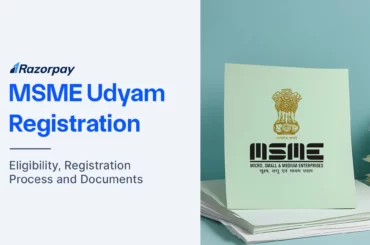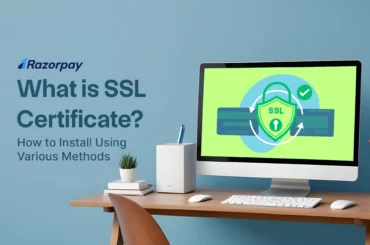With online shopping having become the norm for most consumers, many sellers are now taking their business to the internet to capture a larger market.
As a prospective seller, you have many chores to tick off your list. Apart from getting an e-commerce website built, you must also ensure that your company has been registered in the correct manner, with all the requirements for your business to be up and running smoothed out before you launch.
In India, though the start-up culture has grown and blossomed wildly over the last few years, most companies are not completely aware of the legal procedures and requirements that go into establishing the legitimacy of their business, which can often lead to a myriad of issues down the line.
So, in order to help you prevent the same, we’ve jotted down everything you need to know about registering your company as an online seller.
Registering your company
To begin with, you must identify whether you want to register your company as an LLP (Limited Liability Partnership) or a Private Company. You can also choose to register your company as a Sole Proprietorship, as it is the simplest to register. However, do not that under a Sole Proprietorship, individuals running the business are not protected from any liability, business debts or even obligations. This is why many people prefer forming an LLP.
Ideally, you should register your company on the same state that you intend to operate in. if you are planning to register the company as a private company, you must have:
- An approved name
- A registered office address
- 2 directors with their own director identification numbers
- A minimum capital of Rs 1 lakh
- Digital signature certificates
- Memorandum of Association (MOA) and Articles of Association (AOA)
Additionally, you will need:
- Tax Identification Number (TIN)
- Permanent Account Number (PAN)
- Tax Deduction Account Number (TAN)
- A bank account registered in the company’s name
- GST Number
To find out how much GST you must pay for your goods or services, simply use an online GST calculator.
Additional laws to abide by
If you are an online seller looking to register their company, there are a few other laws that you should keep in mind while running your business. Some of these include:
- Contract law
- The Indian penal code
- Current tax laws
- Shops and Establishment Act
- Intellectual property rights protection
Abiding by these laws can help you protect your business from any potential liability issues that might crop up later. You must also abide by the cyber crime laws that are currently in place in India. These laws make it mandatory for companies to offer data security, data protection, privacy protection, confidentiality maintenance, and cyber security to all consumers that shop on their website.
As an organization, you must take care of additional details like having a proper HR team in place, along with proper employment contracts for everyone who works for you.
How do I select a business structure when registering a company in India?
When selecting a business structure for company registration in India, consider factors like liability, ownership, taxation, and compliance. Options include a sole proprietorship, partnership, limited liability partnership, private limited company, and one-person company. Consult legal and financial experts to make an informed decision.
Required Documents for Business Registration
If you’re looking to register a business in India, there are a few key documents you’ll need.
First up is a proof of identity and address for all the proposed directors of the company, such as their Aadhaar card, passport, or driver’s license. You’ll also need proof of address for the registered office of the company, like a utility bill or rental agreement.
Next, you’ll need to file the Memorandum of Association (MOA) and Articles of Association (AOA), which outline the company’s objectives, rules, and regulations. You’ll also need to provide details of the company’s proposed directors, shareholders, and authorized capital.
Finally, you’ll need to obtain a Digital Signature Certificate (DSC) and Director Identification Number (DIN) for all proposed directors. These are necessary for filing the necessary forms and documents online.
Overall, it can seem a bit overwhelming, but with the right documentation in place, you’ll be well on your way to registering your business in India.
What is the process for registering your company?
You can register your company online by submitting all the required documents such as your PAN, company name, corporate identifiers, and so on. To do so, you must visit the website of the Ministry of Corporate Affairs. You will need your Digital Signature Certificate in order to apply for the online registration, so make sure that you have secured that beforehand.
When you’ve got your DSC and DIN, you can fill out the 1A form online to register your company. Remember to add at least 4 different name options for your company while registering the same.
The RoC generally takes close to 2 days to come back with the approval, and once you have that, you can get the company registered anytime within the following 6 months. If 6 months pass, you must initiate this process all over again!
What else do you need to run your business smoothly?
For many companies looking to sell goods online, it is crucial to have a payment gateway on your website. Most consumers these days prefer getting the payment process over with, and they are less likely to come back to a website if they sense that the payment gateway is not secure enough.
Of course, it is not enough to just have any payment gateway on the website. Instead, pick a gateway that offers a myriad of functionalities that can help you run your business more smoothly.
For instance, Razorpay offers not only solutions for online payments, but also additional functions like creating GST-compliant invoices, a smart dashboard that tracks payments, customer behavior trackers that can help you spot trends, and much more.
With all of this in place, you need never worry about the smaller details that go into running the business and can, instead, focus on the larger picture, like your growth.
What are the types of business structures in India?
- One Person Company (OPC): A company with single ownership and limited liability.
- Limited Liability Partnership (LLP): Partnership with limited liability for partners.
- Private Limited Company (PLC): Restricted shares and limited liability for shareholders.
- Public Limited Company: Allows public trading of shares and limited liability for shareholders.
What is the Cost of Company Registration?
The cost of company registration in India depends on various factors such as the type of company, authorized capital, stamp duty, professional fees, and government filing fees. On average, the cost ranges from 5,000 to 15,000 for a basic registration, excluding additional expenses like legal consultation and documentation. It’s advisable to consult a professional or visit the Ministry of Corporate Affairs website for updated fee structures.
Frequently Asked Questions
Where can I register my company?
If you want to register a new company in India, you have to submit an application to the Ministry of Corporate Affairs (MCA). You can do it all online on the MCA portal from the comfort of your own home! But you’ll need a Digital Signature Certificate (DSC), Director Identity Number (DIN), and other important documents.
What happens if my company name is already taken?
So, you’re planning to start a company in India, that’s awesome! Just remember, before you choose a name for your company, you need to check if it’s already taken. And the Ministry of Corporate Affairs (MCA) keeps a record of all the registered company names, so you’ll need to check their directory. If you find your desired name is already taken, no worries, just come up with a new one that hasn’t been registered. And if you’ve already applied with that name, you’ll need to submit a new application with a different name. It’s not too complicated, just make sure you’ve got a unique name for your business.
Can a foreign national be a director of a company?
Yes. A foreign national can be a director of a company in India, according to Indian company law. But, there are certain conditions that he must fulfil. He should hold a Director Identification Number (DIN). Also, a person cannot act as a Director unless they file a formal application in Form DIR-2 inside 30 days of appointment.
How many days does it take to register a company?
It can take 10-15 days to register your company, if you have all the documents ready.
Is a physical presence of a person needed for company registration?
No. The company registration process is now online so physical presence is not necessary.
How do I check if my company is registered or not?
You can check if your company is registered or not by checking your registration status on the MCA website. Click on ‘View Company/LLP Master Data’ in the MCA Services tab and then enter your company’s CIN number.
Is the company registration process completely online in India?
Yes, the company registration process is completely online in India and done via the MCA portal.
Does a private limited company have continuous existence?
Yes, a private limited company will have continuous existence until it is dissolved or closed.





